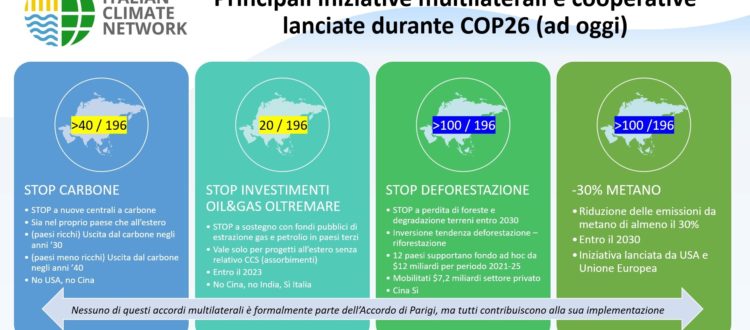UK’S “ALL-IN” AND THE ITALIAN POSITION
“All-in”, on all tables. There is no better metaphor than extreme poker to define the current policy of the British government, organizer with Italy of COP26, with respect to the ongoing negotiations.
The strategy is clear: where it is not possible to go under in terms of ambition, consensus building, drafting of documents and formal commitments inside a negotiation room, a chip is also played on the next table. The UK is promoting politically impactiful side agreements that run parallel to the actual negotiations, the ones that will decide the fate of the Paris Agreement, to push ambition and build an overall outcome that does not depend exclusively on what happens in the formal UNFCCC process.
So, as the 196 delegations debate rules, principles, and reporting under the Paris Agreement, many of those same governments work through their diplomacies to circulate agreements, initiatives, and parallel documents that push ambition on specific issues. These agreements and initiatives are presented through press conferences and side events on the sidelines of negotiations.
This process is not new, and in UN’s climate jargon these parallel agreements are to be read under the broad umbrella of “cooperative initiatives“, which can involve state and non-state actors. In 2016 during COP22, the Marrakech Partnership for Global Climate Action was launched, an attempt by the United Nations to provide these initiatives with a formal and structured framework in view of a future (and necessary) reporting, updating, and visibility of actions and promises. Every year the UNFCCC Secretariat, through the Marrakech Partnership, publishes a yearbook with analysis on the effectiveness and impact of individual initiatives and actions.
What is striking about this year is that, despite the constant presence over the years of specific summits dedicated to the launch of new initiatives, the British government wanted to invest immediately in a differentiated and multi-level way all its political capital to push on some key issues building on the still hot contacts opened through the Italian G20, and then fly to Glasgow for the inaugural Leaders Summit of the COP and continue to launch initiatives throughout the first week of COP.
This is undoubtedly the case of the two agreements that in the first days have conquered the front pages of the newspapers, the agreement on stopping deforestation and the one on the reduction of methane emissions by 2030, followed by the two equally important ones on the exit from coal and on the stop of financing oil & gas investments (not covered by CCS and/or carbon reabsorption projects) in third countries by 2023, the latter signed also by Italy. It remains to be understood if the central condition of the presence of removals is to be interpreted in the agreement as integral to the potential emissions of new plants or if a small (partial) removals installation will be sufficient to justify the investment.
The Italian adhesion to the initiative will certainly have an impact on the financial and development plans of the main national companies active in the oil & gas sector in the international arena. In 2015, in fact, Italy still ranked as the third largest global investor in extraction projects in third countries, after Denmark and Germany. The fulfillment of the Glasgow promise by the Italian government may result in a reduction of environmentally harmful direct investments exceeding 10 billion euros of public funds.
Below the comment of Italian Climate Network on the Italian signature:
It is good that Italy, after an initial moment of hesitation, has signed this commitment. Now, we hope for a similar ambition on the home front: our Country needs real investment in solar and wind power, removing and simplifying bureaucratic and administrative constraints that slow down their development and a proactive planning for the phase-out of coal and gas plants more obsolete.
The British government, through this strategy of diversification, is building the potential success of COP26 through the use of different and multiple stimuli, all parallel but related to the negotiation. The second week will be crucial to understand if the other track, that of technical negotiations (which is never technical), will be able to recover this speed towards the expected goals.
by Jacopo Bencini, ICN Policy Advisor and UNFCCC Contact Point
You are reading this ICN COP Bulletin article as part of the EC DEAR SPARK project. Marirosa Iannelli, Coordinator of the Climate & Advocacy Department of ICN, overviews this activity. ICN monitors negotiations and reports what is happening in Italian and English, on our website and on social channels, as part of a pan-European consortium of over 20 non-profit organizations committed to promoting climate awareness with particular attention to the role of young people and issues related to international cooperation and gender policies.


